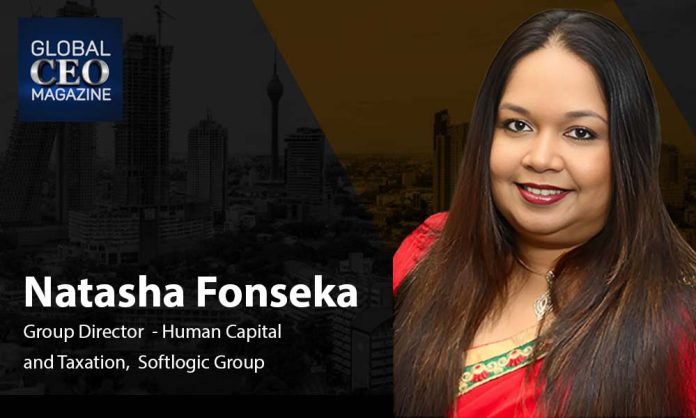In today’s rapidly evolving corporate landscape, leaders who can bridge the worlds of finance and people strategy hold a distinct advantage. Natasha Fonseka, Group Director – Human Capital and Taxation at Softlogic Group, exemplifies this rare blend of expertise. With over three decades of experience spanning financial management, taxation, and human capital, she has become a driving force behind the Group’s dynamic workforce culture and its pursuit of operational excellence.
As the Group Director of Human Capital at Softlogic Holdings, how do you align diverse HR strategies across the conglomerate to foster a unified corporate culture?
A: Aligning HR strategies across multiple industries requires a structured yet flexible approach. We start by defining a common vision and shared HR objectives that align with the Group’s overall strategy. This is supported by a set of core HR principles—such as employee engagement and talent development—that guide all sectors.
At the same time, we acknowledge that each sector has unique operational realities. So, while the overarching strategy remains consistent, we allow for sector-specific tailoring. Empowering business unit leaders to adapt strategies, while ensuring clear communication and alignment, is key. Regular reviews and data analytics help us refine our approach continuously to maintain synergy across the organisation.
In your article “How HR Can Drive Success in Turbulent Times”, you highlighted the importance of building employee commitment from day one. What onboarding practices have you implemented to support this?
A: First impressions truly matter. At Softlogic, we view onboarding not just as a formality but as the foundation of long-term engagement. We start with the company’s purpose—explaining the “why” behind what we do. This helps employees connect their personal values to our mission.
We also encourage activities like writing personal career statements, which shifts focus from just roles and responsibilities to personal growth and motivation. Managers play a vital role in this process by providing early mentorship and ongoing support.
In addition, we conduct wellness sessions—even virtually—on topics like mental health and lifestyle management, ensuring employees feel valued and supported from the start. Onboarding at Softlogic isn’t just an orientation; it’s a strategic engagement process.
With the rapid integration of digital tools in HR, how is Softlogic leveraging technology to enhance talent acquisition and management?
A: Technology has become indispensable in modern HR. At Softlogic, we use Applicant Tracking Systems (ATS) to streamline recruitment, Learning Management Systems (LMS) to support training and certifications, and performance management tools to monitor goals and provide real-time feedback.
HR analytics also play a big role. We track trends in engagement, turnover, and performance to make informed decisions. Digital onboarding platforms allow new employees to access important information and resources ahead of induction.
Moreover, we run virtual wellness programmes using platforms like Microsoft Teams, making these initiatives more accessible across the Group. These tools free HR from administrative tasks and enable more strategic, data-driven decision-making.
Talent retention remains a priority for leading organisations. What are some of the strategies Softlogic has adopted to ensure continuous development and career progression?
A: Retaining talent begins with attracting the right people and setting clear expectations. We’re transparent about compensation, growth opportunities, and development pathways right from the recruitment stage.
We invest heavily in training and mentorship, and provide opportunities for cross-functional mobility within the Group. This not only encourages professional growth but also strengthens internal talent pipelines.
Culture is also crucial. A culture of an organisation is key for retention. Employees don’t leave an organisation only for better pay—it’s more about the environment they work in. Employees do not want to work in a toxic culture. Creating a positive, transparent, and “happy” culture is not the sole responsibility of HR—it requires active commitment from line managers and heads of companies. This is particularly relevant when working with Gen Z employees, for whom organisational culture plays a defining role in their decision to stay or move on.
To support this, we foster a supportive, inclusive work environment, and initiatives like “Coffee with HR” allow open conversations between employees and leadership. Regular feedback, employee surveys, and the use of employee experience platforms all contribute to a workplace where people feel heard, respected, and motivated to grow.
Your role spans both Human Capital and Taxation—an unusual but powerful combination. How do you integrate insights from taxation into your HR strategy?
A: My background in finance and taxation (as an FCMA/CGMA) allows me to look at HR policies through a financial lens. I don’t view people strategies in isolation. When developing HR frameworks, I also consider cost efficiency, tax implications, and financial sustainability.
This dual perspective helps us balance employee needs with business goals, ensuring that our HR initiatives are not only people-focused but also aligned with compliance and fiscal responsibility. It’s a strategic advantage that brings added depth to decision-making.
What would you consider the most important ingredient in building a future-ready workforce?
A: Agility. The future of work is constantly evolving—technology, employee expectations, and business models are all shifting. Organisations must cultivate a culture that embraces change, values continuous learning, and encourages feedback. At Softlogic, we are committed to creating an environment where employees are empowered, informed, and aligned with a greater purpose. That’s what sets a future-ready workforce apart.


